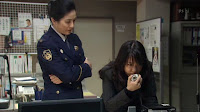Keiji no Genba provides a no-frills look at old school investigation work, focusing on the daily challenges encountered by those charged with the country's law enforcement in a mini-series that doesn't have the commercial appeal of BOSS, the highly dramatic backdrop of Gonzo: Densetsu no Keiji or the attention to forensic detail of Rinjo. On the flipside, its pedestrian quality can be considered its selling point, for though the episodes often lacked the element of surprise, it managed to do away with the pretense of trying to pull a fast one on its viewers at the expense of a logical narrative.
Showcasing just four episodes in its initial run in 2008, this cop show with an all too familiar premise of pairing a rookie cop with a veteran detective was appealingly short, however ostensibly incomplete, until it came back for a second season in 2009 wherein main character Kato Keigo appears to be under the tutelage of a different senior officer.
I've been meaning to write about this series for a while now but kept pushing it off since I wanted to see the second installment of this series to determine if it was actually any good or just some random mid-season insert in NHK's programming schedule. Unfortunately, despite years of waiting, its second season slipped through the cracks and never caught the attention of subbers. Come to think of it, I also never got around to securing the raws after the Feds took down Megaupload.
I've been meaning to write about this series for a while now but kept pushing it off since I wanted to see the second installment of this series to determine if it was actually any good or just some random mid-season insert in NHK's programming schedule. Unfortunately, despite years of waiting, its second season slipped through the cracks and never caught the attention of subbers. Come to think of it, I also never got around to securing the raws after the Feds took down Megaupload.
* * *
Keiji no Genba essentially chronicles the on-the-job training of fledgling cop, Kato Keigo (Moriyama Mirai) with soon-to-retire detective, Isesaki Shoichi (Terao Akira). The series starts with the investigation of a bomb threat at a local supermarket and proceeds to immerse viewers into the variety of incidents and cases that the members of the police force are asked to respond to on a daily basis. As mentioned earlier, what differentiates this show from others is that the depiction of events are always kept grounded, and law enforcement as an occupation is neither shown to be glamorous and exciting. It even gives particular emphasis to debunking the nobility and heroism often attributed to self-sacrifice, impressing upon the main character the value of staying alive in order to help others.
Keigo's foray into police work is a lesson on calm logic and keen observation, patiently imparted upon him by a kind yet firm mentor. The difficulties faced by a newbie cop is highlighted in each episode -- the first one pits the rookie's zeal against a seasoned detective's intuition; the second, highlights the difficulty of remaining impartial when the person interrogated is someone you know; the third, shows how stakeouts and the apprehension of the criminal can be a tedious affair; and the last episode, pretty much demonstrates how rash decisions based on good intentions can be as lethal as not taking action. In all the cases, the culprit is shown to be an ordinary person. Criminal masterminds or psychopathic villains are not in attendance, for neighbors, housewives, teachers and doctors dealing with their own set of circumstances are shown to be equally capable of breaking the law. Serious crimes are portrayed but never in a sensational light, as such the show doesn't have a sense of urgency or intrigue, which sadly means, that it doesn't come off as particularly compelling or must-see television.
In Keiji no Genba, crime solving is more a matter of discipline and a product of a good work ethic. It is acquired through hard work and field experience; that is, if one were to believe the elderly officers tasked to mentor the new recruits that will soon be occupying their posts. The older generation of law enforcers do their best to impart whatever knowledge they have to their younger counterparts in the absence of intermediate officers to guide the latter given the country's aging population. The mini-series plays up this dilemma by focusing on the existing generation gap in the characterization of its two leads as well as the people they work with. Less subtle but equally effective, the same can be seen in the general hair and wardrobe design of the series.
Moriyama Mirai is adequate in the role of Kato Keigo, however it's the veteran actors, Terao Akira and Uzaki Ryudo, that lend credibility to the series and provide its moral core.
All in all, the first season of the series is watchable but extremely slow and uneventful going by today's expectations of the genre. As a buddy-cop series, the characters harken back to Kurosawa's Stray Dog, which means that any disagreement between them is handled in a civil manner with no prolonged conflict. As a police procedural, it does not have a penchant for violence or detail, neither does it attempt to be clever in any way or form, making this mini-series a middle-of-the-road entry.
All in all, the first season of the series is watchable but extremely slow and uneventful going by today's expectations of the genre. As a buddy-cop series, the characters harken back to Kurosawa's Stray Dog, which means that any disagreement between them is handled in a civil manner with no prolonged conflict. As a police procedural, it does not have a penchant for violence or detail, neither does it attempt to be clever in any way or form, making this mini-series a middle-of-the-road entry.

























